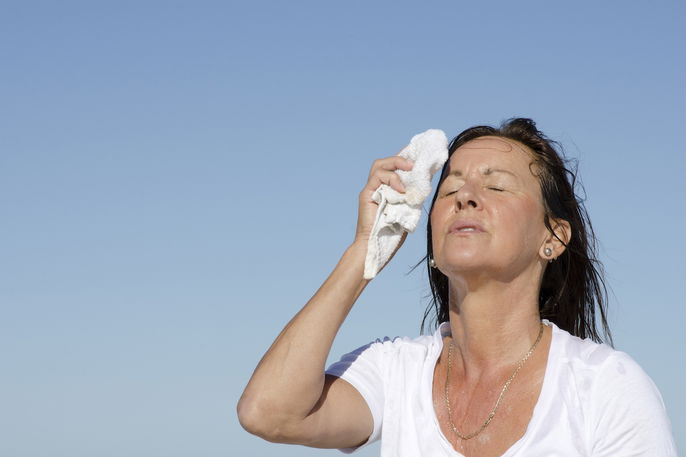Craniofacial hyperhidrosis is a condition characterized by excessive sweating in the face and scalp. This condition can occur without any underlying health issues or may be triggered by other medical factors, such as hormonal changes or medication.
While sweating is a natural response to help regulate body temperature, craniofacial hyperhidrosis leads to an abnormal overproduction of sweat. The condition can have a significant impact on daily life, affecting social interactions and self-confidence.
Treatment options for craniofacial hyperhidrosis range from non-invasive solutions, such as Botox injections and iontophoresis, to surgical interventions in more severe cases. Consulting a dermatologist is recommended for a proper diagnosis and to discuss appropriate treatment plans if the condition interferes with daily activities or becomes uncomfortable.

Main causes
Craniofacial hyperhidrosis can be caused by various factors, some of which are more common than others. Understanding these causes is key to determining the most effective treatment for managing the condition.
1. Primary hyperhidrosis
Primary hyperhidrosis is the most frequent cause of craniofacial sweating, where the body produces excessive sweat without an underlying health issue. This type of hyperhidrosis is typically localized to specific areas, including the face and scalp.
Also recommended: Excessive Sweating: 8 Common Causes (& What to Do) tuasaude.com/en/excessive-sweating2. Secondary hyperhidrosis
Secondary hyperhidrosis refers to excessive sweating caused by another medical condition, such as Parkinson's disease, menopause, or hyperthyroidism. In these cases, craniofacial hyperhidrosis may be a symptom of the primary disorder.
3. Stress and anxiety
Emotional triggers like stress and anxiety can also contribute to excessive sweating in the face and scalp. These emotional responses activate the body’s sympathetic nervous system, leading to an increase in sweat production.
4. Medications
Certain medications, such as antidepressants, can cause sweating as a side effect. This may result in craniofacial hyperhidrosis, particularly when the body adjusts to the drug.
How to treat
Craniofacial hyperhidrosis treatment options depend on the severity of the condition and its underlying causes. Several treatments can help reduce excessive sweating and improve quality of life.
1. Botox Injections
Botox is one of the most effective treatments for craniofacial hyperhidrosis. The injection works by blocking the nerve signals that trigger sweat production in the face and scalp, providing relief for several months after each session.
2. Iontophoresis
Iontophoresis involves the use of a mild electrical current to temporarily block sweat glands. While it’s more commonly used for hands and feet, it can also be effective for craniofacial hyperhidrosis with multiple sessions.
3. Surgical Options
In cases where other treatments fail, surgery may be considered. Sympathectomy, a procedure that involves cutting or clipping the sympathetic nerve to reduce sweat production, is one surgical solution for severe cases of craniofacial hyperhidrosis.
Prevention tips
While craniofacial hyperhidrosis can be difficult to prevent, several strategies may help reduce the frequency and severity of sweating episodes. Implementing these tips can help manage the condition and prevent discomfort.
1. Avoid hot environments
Extreme heat can exacerbate excessive sweating. Staying cool with air conditioning or fans can help limit sweating episodes.
2. Manage stress
Stress management techniques such as meditation, yoga, and deep breathing exercises can reduce the emotional triggers that contribute to craniofacial sweating.
3. Wear breathable clothing
Light, breathable fabrics allow air circulation around the face, helping to prevent excessive sweating caused by trapped heat.
3. Use antiperspirants for the face
Clinical-strength antiperspirants, designed for facial use, can be effective in reducing sweat production. It's essential to test these products on a small patch of skin first to avoid irritation.
4. Stay hydrated
Drinking plenty of water helps regulate body temperature and can reduce the need for the body to sweat excessively.





























